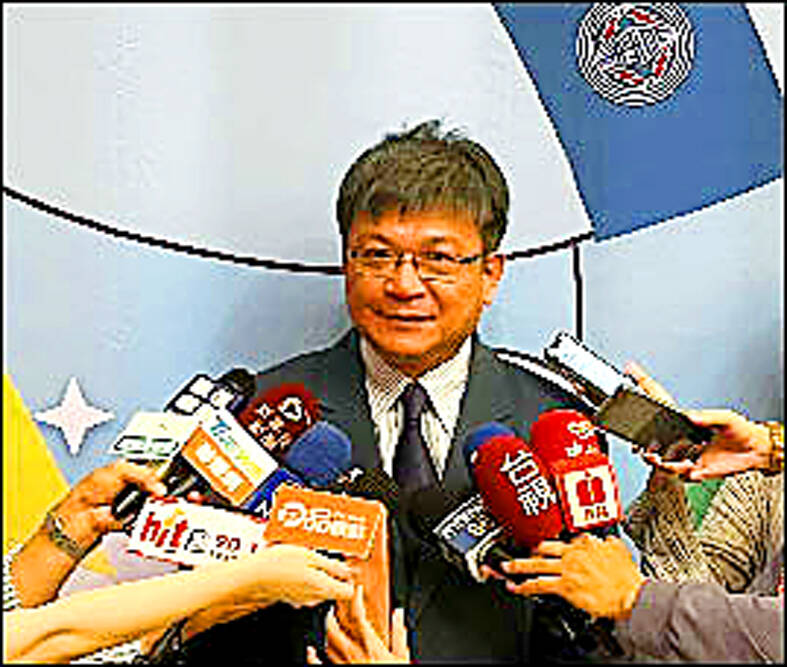Taiwan needs an efficient energy market if it is to reach net zero emissions by 2050, Taiwan Power Co (Taipower, 台電) chairman Tseng Wen-sheng (曾文生) said at a climate change summit on Wednesday.
The development of renewable energy requires new technologies and investment, “decisions about which are multifaceted,” Tseng said, adding that the government has many factors to consider, which can make decision-making slow and inefficient.
If renewable energy-related industries can develop according to market logic, decisions can be made more efficiently, “but it all comes down to [renewable energy] being able to be traded on an [efficient] energy market,” he said.

Photo: CNA
The Electricity Act (電業法) was amended in 2017, as a first step to liberalize the green energy market, allowing power generated by renewable energy facilities to be sold directly to consumers.
Major Taiwanese enterprises in need of large amounts of green electricity, such as members of RE100 — a global initiative calling for businesses to commit to 100 percent renewable electricity — have mostly opted to enter into corporate power purchase agreements (CPPA) that last up to 20 years with renewable energy generators such as offshore wind developers.
Renewable energy generators nevertheless have concerns about weaker buyers’ ability to stick to long-term contractual obligations and are thus less willing to sign CPPAs with them, a concern that has spurred the Ministry of Economic Affairs to introduce a government-backed renewable power credit guarantee scheme.
The scheme is to help mitigate the default risk of corporate consumers that would discourage renewable energy developers from signing agreements with them.
Twenty-year “one company, one generator” agreements can be “painful for any purchasing manager,” as it is possible green power would get cheaper in the future and there is no way to trade purchased green power in those 20 years, Tseng said.
He said an “intermediary mechanism” should be established to “equalize the risk of uncertainties” the company could experience in the years covered by the agreement.
The intermediate mechanism requires collaboration between two sides, Tseng said.
“One is on the supply side, such as the financial institutions, who can help re-mix different batches of energy products into a product that has a relatively stable price,” he said.
“The other is the demand side,” Tseng said. “As buyers might need different amounts of green electricity in different years, efficiency can only be achieved if they can transfer their purchased power to others freely.”
Only with such an energy market can a balance between supply and demand be achieved, Tseng said.
Tseng said he expects Taipower, as a renewable energy generator, to first work with major state-owned enterprises to stimulate the further development of the green energy market.

Semiconductor business between Taiwan and the US is a “win-win” model for both sides given the high level of complementarity, the government said yesterday responding to tariff threats from US President Donald Trump. Home to the world’s largest contract chipmaker, Taiwan Semiconductor Manufacturing Co (TSMC, 台積電), Taiwan is a key link in the global technology supply chain for companies such as Apple Inc and Nvidia Corp. Trump said on Monday he plans to impose tariffs on imported chips, pharmaceuticals and steel in an effort to get the producers to make them in the US. “Taiwan and the US semiconductor and other technology industries

A start-up in Mexico is trying to help get a handle on one coastal city’s plastic waste problem by converting it into gasoline, diesel and other fuels. With less than 10 percent of the world’s plastics being recycled, Petgas’ idea is that rather than letting discarded plastic become waste, it can become productive again as fuel. Petgas developed a machine in the port city of Boca del Rio that uses pyrolysis, a thermodynamic process that heats plastics in the absence of oxygen, breaking it down to produce gasoline, diesel, kerosene, paraffin and coke. Petgas chief technology officer Carlos Parraguirre Diaz said that in

CHIP WAR: Tariffs on Taiwanese chips would prompt companies to move their factories, but not necessarily to the US, unleashing a ‘global cross-sector tariff war’ US President Donald Trump would “shoot himself in the foot” if he follows through on his recent pledge to impose higher tariffs on Taiwanese and other foreign semiconductors entering the US, analysts said. Trump’s plans to raise tariffs on chips manufactured in Taiwan to as high as 100 percent would backfire, macroeconomist Henry Wu (吳嘉隆) said. He would “shoot himself in the foot,” Wu said on Saturday, as such economic measures would lead Taiwanese chip suppliers to pass on additional costs to their US clients and consumers, and ultimately cause another wave of inflation. Trump has claimed that Taiwan took up to

SUBSIDIES: The nominee for commerce secretary indicated the Trump administration wants to put its stamp on the plan, but not unravel it entirely US President Donald Trump’s pick to lead the agency in charge of a US$52 billion semiconductor subsidy program declined to give it unqualified support, raising questions about the disbursement of funds to companies like Intel Corp and Taiwan Semiconductor Manufacturing Co (台積電). “I can’t say that I can honor something I haven’t read,” Howard Lutnick, Trump’s nominee for commerce secretary, said of the binding CHIPS and Science Act awards in a confirmation hearing on Wednesday. “To the extent monies have been disbursed, I would commit to rigorously enforcing documents that have been signed by those companies to make sure we get